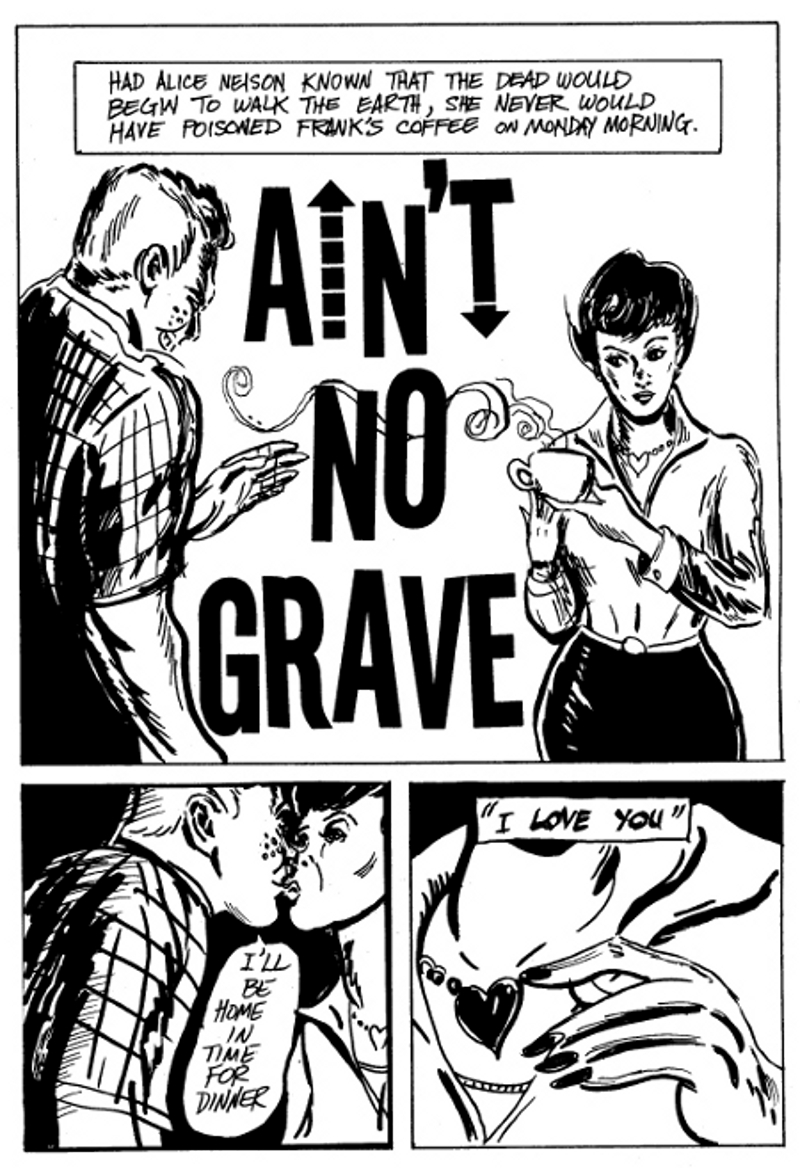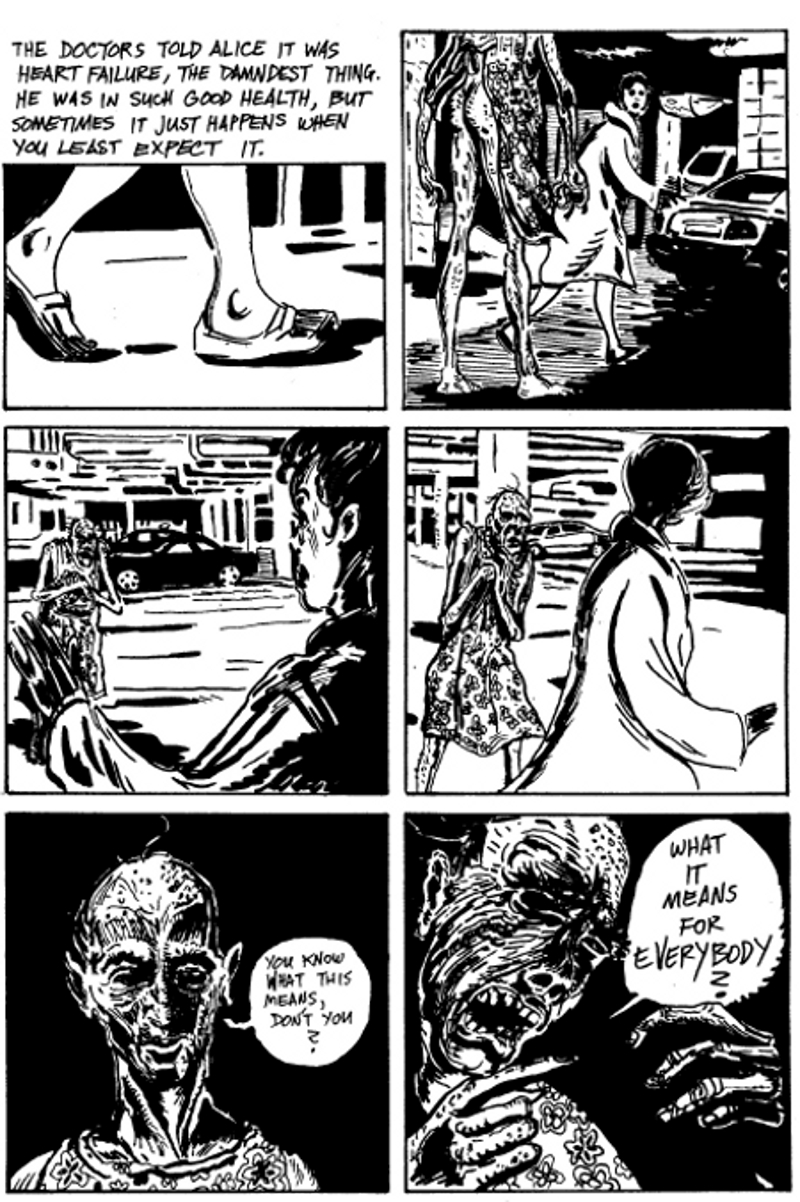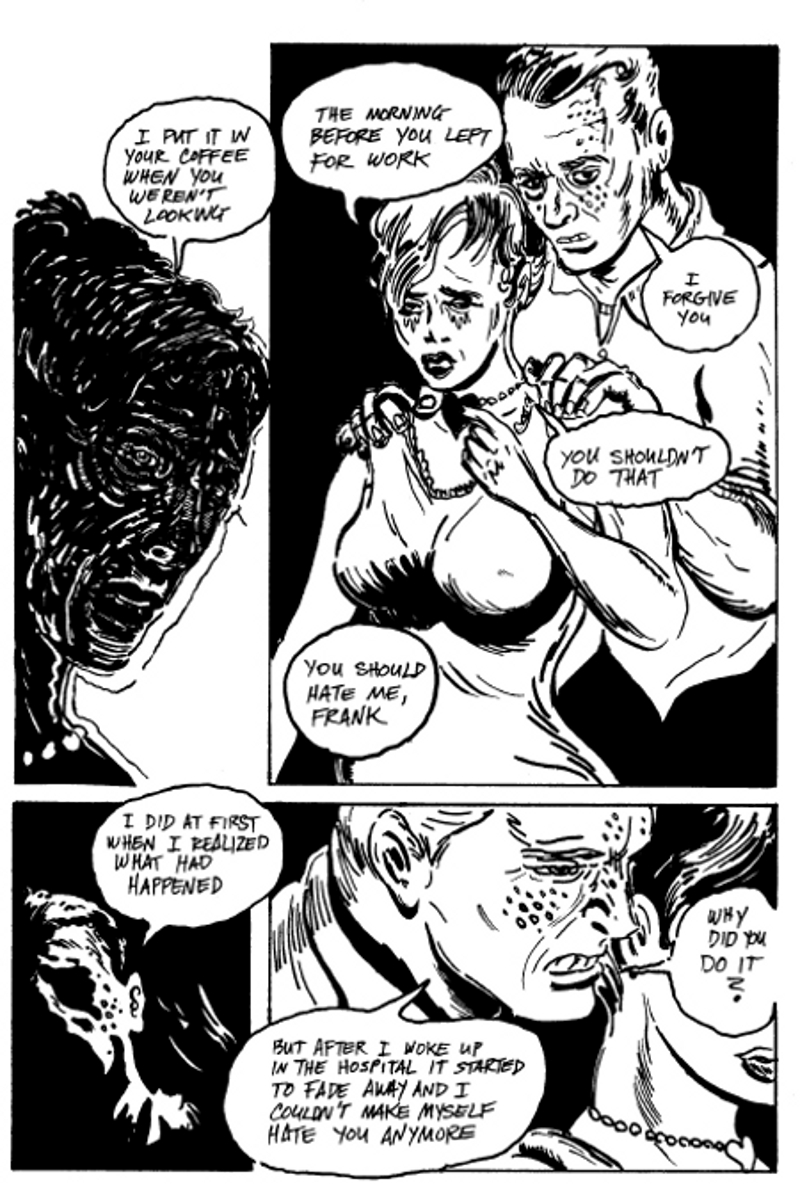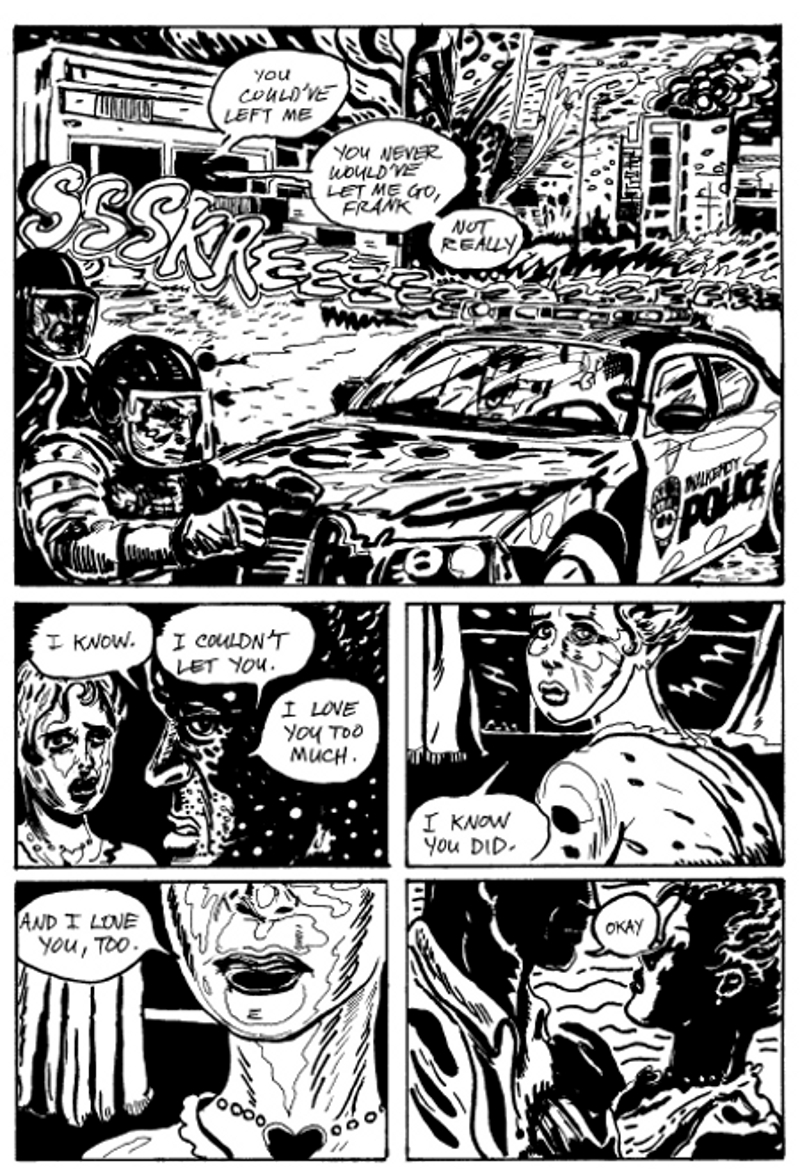Ain't No Grave
STORY BY MAGEN TOOLE
ART BY JOHN DAVID BROWN
READ BY MIRACLE JONES
MUSIC BY GOODMAN CARTER




















Had Alice Neilson known that the dead would begin to walk the earth, she would have never poisoned Frank's coffee on Monday morning. She would have never emptied the tiny glass dropper into the cooling pot while Frank contentedly watched the news, craning his neck and leaning back in his seat to see the television in the next room from his perch at the kitchen table. It was the same way that he did every morning, quietly eating his whole wheat toast with butter and strawberry jam as Alice stood at the sink, watched the crawl of morning traffic on the street beneath their apartment, and said nothing.
At eight o'clock Frank kissed Alice goodbye at the door and told her he would be back home in time for dinner. She smiled, long fingers toying idly with the aged heart pendant around her neck and told Frank that she loved him. By nine the reports had begun coming in between songs and radio static during Alice's morning commute. It had been going on for days but no one noticed, starting first in the cities, when the cemeteries were too full to bury any more bodies. The crematoriums were taking the overrun of the dead in stacks in basements and zippered bags in the halls. Now back to your regularly scheduled programming, as Alice locked her car door and walked the half-block's worth of parking garage between her and Westfield Marketing, LLC, and didn't think about the dead.
Over Monday's lunch (grilled chicken salad with bleu cheese and Tina from Accounting), the television above the cafe's counter bar fuzzed and snowed with news reports and red tickers spewing numbers and stock predictions. Tina talked about her kids and fights with Billy and plans for summer vacations, waving her fork between bites to punctuate and circle items of interest. The countryside outside mile-marker ten on I-91 followed the city quickly; old roadside cemeteries with ramshackle fences were spilling over with recently deceased, the ground bursting with coffins buried side-to-side, end-to-end. Officials in the sheriff's office confirmed the burning of bodies in empty lots and fields. Alice nodded her head at the end of each punctuation point and simply tugged at the heart pendant and its old silver chain while her chicken salad grew cold.
At three o'clock Alice's phone went off, and she excused herself for the day. Frank Neilson was taken to the hospital before rush hour traffic and by seven o'clock was pronounced dead. The doctors told Alice that it was heart failure, the damnedest thing. He was in such good health, but sometimes it just happens when you least expect it. In the emergency room lobby she signed paperwork and ignored the dull hum of the special bulletin rumbling from the small radio on the desk nurse's counter. Ambulances were no longer picking up the dead in residences or nursing homes, funeral homes unable to provide services, having no means to cope with the backlog of bodies. Bonfires were reported in Walker County just outside of the city limits, where people were burning their loved ones in piles of dead bodies, still clothed, no autopsy, embalming or religious rites, to keep them from rotting where they dropped.
Alice signed her name, dotted the i's, and quietly thanked the desk nurse with unused tissues still trapped in the sleeve of her blouse. She crossed the fluorescent-peppered parking lot to her car beneath a flickering yellow lamp, heels click-clicking on the cold concrete and felt nothing as she unlocked her door. The sound of breathing gave her momentary pause, and looking up Alice noticed a man in her peripheral.
He was a frail man, hunched and skeletal under a patterned blue hospital gown, his meat doing little more than hanging from his withered ribcage and cheekbones. Age made deep creases in his thin face, wrinkles gathered around eyes black under intermittent light and grayed hair receded in thin wisps from his stern brow. Alice took in a breath and held it.
"You know what this means, don't you?" the man said, his voice as sunken and weathered as his face. "What it means for everybody?"
"You should go back inside now," Alice answered, softer than she would have liked, "It's cold out, okay?"
The man said nothing. After a moment Alice ducked her head and slipped into her car, turned the key in the ignition, and tried not to look back at him as he disappeared from her rearview mirror. She failed. That night she would return to an empty apartment to sleep alone, surrounded by faces in photographs and the clutter and tiny trinkets she and Frank had collected together. She would dream of her husband, of his white teeth, blonde hair and blonde skin, broad and tall and good all over, and wake up to a wet pillow.
***
Alice didn't check her messages on Tuesday morning. Instead she glanced at the caller ID (two calls from her mother and one from her sister Pam in Iowa), abandoned the phone in its cradle, and didn't bother dressing for work. Slipping out of a cold bed and into her dressing gown, to make coffee and switch on the television, Alice wiped salt and mascara from under her eyes and felt nothing.
Her kitchen was a hollow space now. It surrounded her in the sealed wooden cabinets and expensive fixtures that Frank had scrimped and saved for, working overtime and calling in favors in order to have the renovations done in time for her thirty-first birthday. Alice waited for the pot to brew, hissing and sputtering quietly above the special reports rumbling in from the next room. She pulled her robe around herself, tied it off in a knot, and looked out on the empty street outside her apartment. The world seemed colder, the sky somehow grayer, without the slow crawl of traffic and footsteps on the pavement.
On the television, news anchors with loosened ties and undone shirt collars read off statistics, between cell phone video footage and stills from the dashboard cameras of police cars. Panic reported in tiny Congo villages, mass suicides in Bangladesh; there were bodies left on autopsy tables, in the streets in crashed cars and the backs of abandoned ambulances. The farm-belt was snowing with black ash as children made angels in the dust and men with Bibles beat their fists on podiums. Alice twisted her silver pendant between her finger and thumb and heard nothing of it.
The phone rang at nine-thirty. Alice crossed the apartment for the phone on the coffee table. She swallowed the knot that had gathered in her throat, wiped a dot of wetness from the corner of her left eye with her thumb. Seeing her mother's number on the caller ID, she sucked in a breath.
"Hello?"
"Are you watching the news?" Her mother's voice came over the line in a high flutter of panic. "Alice, it's all over the TV. Oh my god. Alice."
A dead man walked across Alice's television in Pacoima, his chest open in a long y-incision. He dragged a tattered trench coat behind him, shrugging into the sleeves as his ribcage glistened wetly between the flaps of flesh that hung from his shoulders like an unbuttoned vest. This video may be shocking to young or sensitive viewers. The morning news anchor had begun to recite Catholic prayers over the sounds of police gunfire and screaming.
"Oh my god. Are you there, Alice?"
The floor beneath Alice's feet dropped like her heart dropped, a cold wet weight falling into the pit of her stomach. She fell with it, in the back of her mind, through the floorboards, the ceiling of the next unit, until everything around her spun and shuddered.
"What about Frank?"
***
There was no place left to bury the dead, so the dead sought no rest.
They had come from hospitals and morgues, operating tables and freezers, rising from where they died as though waking from a dream. Dreaming, though not fully awake through eyes clouded by disease, decay, and the spindly webs of veins. One by one the dead all walked home quietly, following familiar routes through abandoned streets and highways to their houses. Some were on bare feet while others still wore what they had died in, or clothing found or stolen, to find that their families had shut their doors and locked their windows, and boarded themselves in. So the dead sat outside, on porch steps and welcome mats, and with nowhere else to go, they waited.
Governments had declared varying states of emergency under flashbulbs in televised press conferences. Outside and away from cameras and news bulletins, police and soldiers took up arms in towns and cities, shoved gloved hands into reporters' faces, told them to get out of the area or they would be shot. Roads were closed, stories of looting coming in across the world on the heels of fires and riots. People ran into churches praying for salvation while others waved holy books on street corners, jumped from bridges or shot themselves. Sometimes they shot their children, too; their spouses, their parents and friends, but just until they had started to get back up again.
No Rapture followed with them. There were no Horsemen or walls of fire climbing over cities and seas. Hell did not rattle at windowpanes while the Devil paced outside the front door, polished shoes click-clacking on the concrete above his greasy black laugh. There were only people trying to go home.
Sitting in her living room, Alice Neilson watched the fires on her television screen and outside her window. She clutched the silver heart and chain between her fingers and held her breath. Frank would be back by dinnertime, just as he promised, even if he was a day late.
***
Alice had just put the last plate on the table when she heard the turn of the lock at the front door. The shuffle-scrape of metal pieces traveled down the hallway lined with college photos, wedding photos, all smiling faces and white teeth, to the kitchen. Alice waited silently by the stove, in a patterned yellow sundress and some flip-flops, her hair shower-clean, her makeup fresh. She tugged at her necklace and refused to make a sound.
Frank entered the kitchen on stiff legs. Arms slack at his sides, head tipped towards the linoleum floor, he walked past Alice to the table, taking his usual seat on the left by the door to the living room, where he would perch to eye the television news. He settled into the chair silently, save the scratchy rustle of his trouser legs against the upholstered seat. Frank was whiter than Alice remembered him ever being, kissed by the sun in his chest and the freckles on the bridge of his nose. In this light he was pale, skin grayed in the hollows of his cheeks and under his eyes. It gave Alice pause, like the ridge of blue veins around Frank's knuckles gave her pause, in a thin spider's web of decay. Alice didn't recognize the black trousers and white shirt that Frank wore with bare feet. To herself she wondered first where Frank got them, then what it must have felt like to walk on bare feet from the hospital here, and if he had felt anything at all.
Alice swallowed the thickness in the back of throat and stepped aside, moving around to take her spot across from him, scooting her chair close to her plate of pot-roast and steamed vegetables. Silence stretched to fill the space between them and their dinner, buoyed on the heat curling up from their plates in visible fingers. Frank stared at the table for one long moment. He was not at all the smiling, cheerful husband that came to the table every night, softly kissing Alice's neck at the sink or the stove, then squeezing her hand atop the table over grace. She had no expectations of this. He said nothing, looking far away from their kitchen before reaching for his fork to begin eating, the soft clatter of the utensil against the ceramic plate causing Alice to flinch. Sucking in a breath, she lowered her head, picked up her fork, and ate.
"Pass the salt," Frank finally said halfway through his pot-roast. His voice was like sandpaper, fine and coarse, throat dry from the day's disuse.
Alice looked up to meet the earnest glint in Frank's eyes, the soft line of his mouth. She slid the salt shaker to him carefully, watching him take it to liberally salt his carrots before eating them appreciatively. Unable to find her appetite Alice stood up from her seat, cleared her plate and silverware, and carried them to the sink with weakness in her fingers and wrists. She rinsed the night's dishes quietly, staring out the window and listening to the human sounds of Frank's eating, before the tell-tale scrape of his chair on the floor brought him close enough to place his plate in the sink. She reached for the sponge and soap.
"You killed me." Frank's words were without spite or malice, his body devoid of warmth as he stood at Alice's back, voice filling the space between them.
"I know." Alice felt something twist in the empty pit of her stomach, like an angered worm or knotted rope. She stiffened her back and scrubbed the dirty roasting pan dutifully. "I'm sorry."
"How did you do it?" Frank swallowed but betrayed nothing. "It was poison, wasn't it?"
She nodded.
"Makes sense."
"I." Alice let out a breath, a wet sigh from the back of her throat. Her fingers curled into the sponge, raking it across the pan's belly in a scrape-scrape-scrape. "I put it in your coffee when you weren't looking, the morning before you left for work."
Frank inhaled when Alice exhaled, and it felt natural. He reached forward to grab Alice's hands, stilling them between his thicker, longer fingers. "I forgive you."
"You shouldn't do that." Wetness swelled in the corners of Alice's eyes before she could will her hand away to tend to it, making a mess of her makeup. "You should hate me, Frank."
"I did, at first, when I realized what happened. But after I woke up in the hospital it started to fade away, and I couldn't make myself hate you anymore." Frank angled his head, his nose buried in a wisp of hair behind Alice's ear. He breathed in and Alice shivered. "Why did you do it?"
"I felt trapped." The sniveling sound that Alice heard under her own voice caught her off-guard. "I don't know why, not really. The longer we were together, I just felt so...crushed, by you."
The kitchen shrunk around them, like a pinhole in space, or a cavern lit only by the fires across the street. Frank's hands enveloped Alice, like his arms and his body did, his smell (cologne, cotton, coffee with cream) filling her nostrils from the resolve of memory alone.
"You could've said something," Frank said, sounding hurt. "We could've talked, or tried."
"I know."
"I gave you everything I had. Everything you ever wanted."
"I know you did." Alice could feel Frank's breath in her hair, stuttered and stale, and hoped it wasn't her imagination carrying her away. "You were always too good for me. You deserved someone better."
A police siren made the entire building shiver as it sped past the kitchen window. Alice shivered with it. Frank made no motion save a swipe of thumb across the bones of her wrists.
"You could've left me."
"You never would've let me go, Frank," she said, "Not really."
"I know," he said, after a pause. "I couldn't let you. I love you too much."
"I know you did." Alice noticed the way Frank's hands squeezed her wrists, then let go. "And I love you too."
Frank smiled into Alice's hair. "Okay."
Turning her around, Frank pressed Alice against the sink, trapping her there. When he raised his hands to wrap them around her throat, Alice didn't stop him. She could only close her eyes, and placing her hands over the ones tangled in the necklace he'd given her for their first anniversary (Love always, Frank had scored across the back, just above her sternum), she held her breath and waited.
Then Alice Neilson woke up in her bed, to the smell of coffee brewing in the kitchen.




